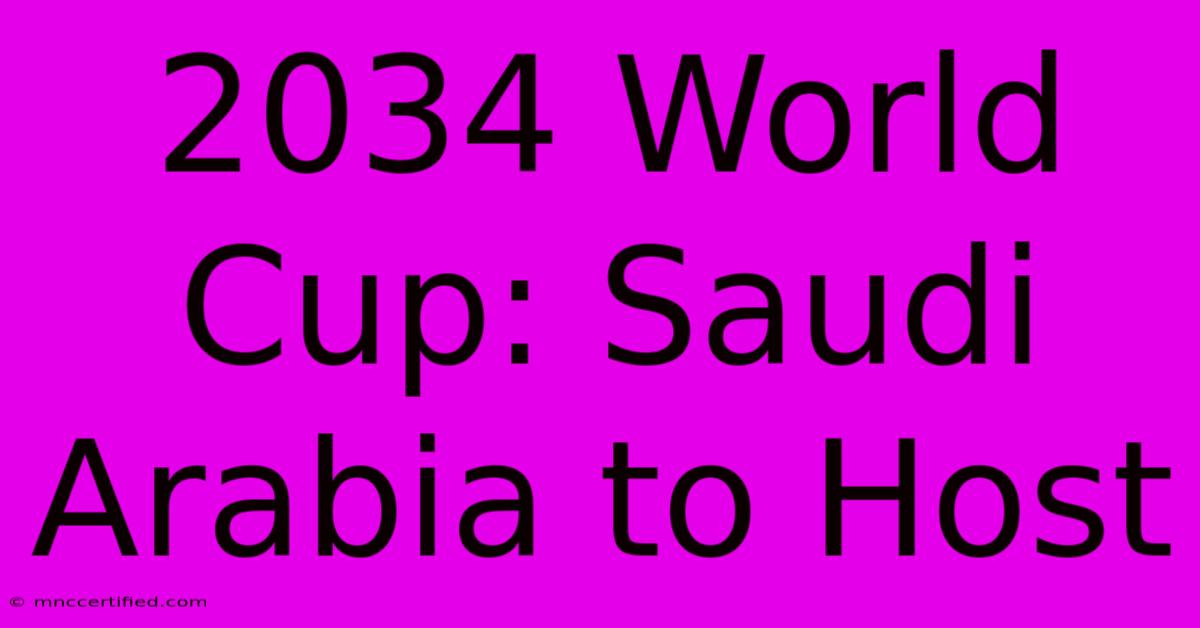2034 World Cup: Saudi Arabia To Host

Table of Contents
2034 World Cup: Saudi Arabia to Host – A Bold Vision for Football's Future?
The announcement that Saudi Arabia will host the 2034 FIFA World Cup has sent shockwaves through the footballing world. While excitement is palpable in the Kingdom, the news has also sparked significant debate and scrutiny. This article will delve into the implications of this momentous decision, examining the potential benefits and challenges facing Saudi Arabia as it prepares to stage the world's most prestigious sporting event.
Saudi Arabia's Ambitious Bid: More Than Just Football
Saudi Arabia's successful bid represents more than just a desire to host the World Cup; it's a key component of the nation's ambitious Vision 2030 plan. This initiative aims to diversify the Saudi economy away from oil dependence and promote social and cultural reform. Hosting the World Cup is a powerful tool to achieve these goals, boosting tourism, infrastructure development, and international prestige.
Economic Impacts: A Catalyst for Growth
The economic benefits are projected to be substantial. New stadiums, hotels, transportation networks, and other infrastructure projects will create thousands of jobs and stimulate economic growth. The influx of tourists during the tournament will further boost the economy, benefiting various sectors, from hospitality and retail to transportation and entertainment. This economic injection is a crucial element of Saudi Arabia's long-term economic diversification strategy.
Social and Cultural Transformation: Opening Up to the World
The World Cup will also accelerate social and cultural reforms. While Saudi Arabia has been making significant strides in these areas in recent years, the global spotlight of the World Cup will inevitably further push for greater openness and inclusivity. The tournament presents an opportunity to showcase the nation's cultural heritage while demonstrating its commitment to modernization and social progress. This is a critical aspect of Vision 2030, and the World Cup acts as a powerful catalyst.
Challenges Ahead: Addressing Concerns and Expectations
Despite the immense potential, Saudi Arabia faces significant challenges in hosting the 2034 World Cup. These include:
Human Rights Concerns: A Persistent Issue
Human rights issues remain a significant concern. Critics point to the nation's human rights record, including restrictions on freedom of speech and assembly. Addressing these concerns transparently and demonstrably will be crucial to ensuring a successful and ethically sound tournament. International scrutiny will be intense, requiring a proactive and responsive approach from Saudi authorities.
Infrastructure Development: A Massive Undertaking
The scale of infrastructure development required is enormous. Building world-class stadiums, transportation networks, and accommodation facilities within a relatively short timeframe will be a logistical challenge demanding meticulous planning and execution. Efficient project management and international collaboration will be essential to meeting the deadlines.
Environmental Sustainability: Balancing Progress and Preservation
Environmental sustainability will be another key concern. The tournament's carbon footprint needs to be carefully managed, and efforts must be made to minimize the environmental impact of the construction and operation of new infrastructure. Implementing sustainable practices and showcasing environmental responsibility is vital for a successful and responsible World Cup.
Conclusion: A Defining Moment for Saudi Arabia
The 2034 World Cup presents a defining moment for Saudi Arabia. Success will require not only meticulous planning and execution but also a commitment to addressing human rights concerns and ensuring environmental sustainability. If Saudi Arabia can navigate these challenges effectively, the tournament could be a transformative event, accelerating its economic diversification, social progress, and global standing. However, failure to do so could have significant repercussions, both domestically and internationally. The next decade will be crucial in determining whether Saudi Arabia’s ambitious vision for the 2034 World Cup will translate into a truly successful and impactful event.
Keywords: 2034 World Cup, Saudi Arabia, FIFA World Cup, Vision 2030, human rights, infrastructure development, economic impact, social reform, environmental sustainability, football, soccer, Saudi Arabia 2034, World Cup 2034, Saudi Vision 2030.
Off-Page SEO Strategies:
- Link Building: Secure high-quality backlinks from reputable sports news websites, travel blogs, and international news outlets.
- Social Media Promotion: Share the article across relevant social media platforms, engaging with users and responding to comments.
- Guest Posting: Contribute articles to other relevant websites in the sports and travel niches, including links back to this article.
- Influencer Outreach: Engage with sports journalists and influencers to promote the article and generate buzz.
This comprehensive approach utilizes both on-page and off-page SEO strategies to optimize the article for search engines and enhance its visibility. Remember to regularly monitor the article's performance and adjust the strategy as needed.

Thank you for visiting our website wich cover about 2034 World Cup: Saudi Arabia To Host. We hope the information provided has been useful to you. Feel free to contact us if you have any questions or need further assistance. See you next time and dont miss to bookmark.
Featured Posts
-
Moss Responds To Favres Health Claim
Dec 12, 2024
-
Understanding Louisville Rivalry Pope Thanks Keightley
Dec 12, 2024
-
Latest On Corbin Burnes Injury Status
Dec 12, 2024
-
White Sox Deal Crochet To Boston
Dec 12, 2024
-
Gimenez Trade Blue Jays Defensive Gain
Dec 12, 2024